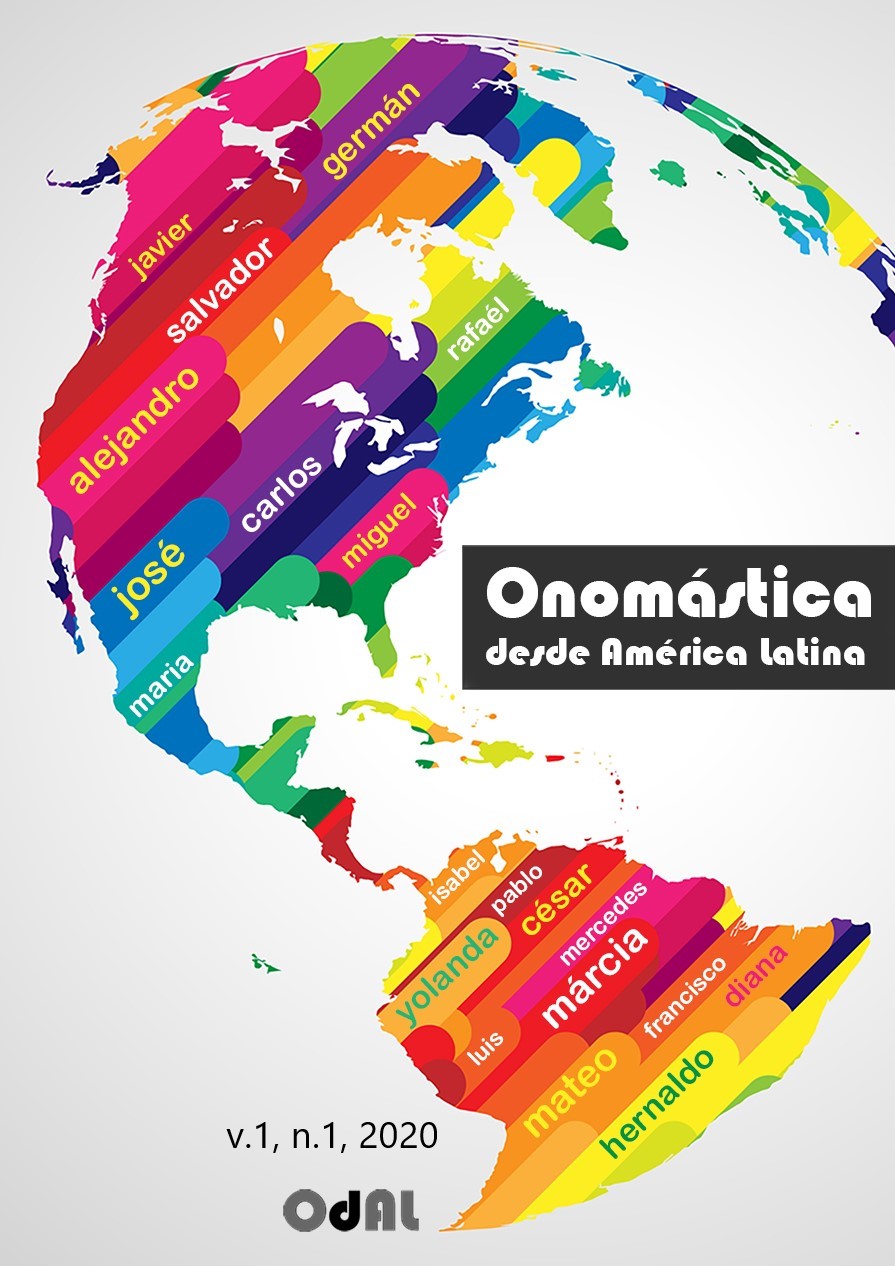La construcción de la identidad de género a partir de la selección del nombre de pila
DOI:
https://doi.org/10.48075/odal.v1i1.24165Palavras-chave:
Nombre de pila, atribución, proyecto parental, identidad de género.Resumo
Reflexión en torno al papel que la selección del nombre de pila desempeña en la construcción de la identidad de género de sus portadores. El apartado crítico se fundamenta en los estudios de género de Marta Lamas Encabo (1996, 2000, 2016) y en las investigaciones sobre la atribución del nombre de pila desde la socioantroponimia. La hipótesis del trabajo es que la selección del nombre de pila, como parte del proceso de atribución (Aldrin 2011), contribuye a la construcción de la identidad de género del portador al integrarlo en una cultura que distingue, fundamentalmente, entre lo masculino y lo femenino.
Anclado sobre la dimensión simbólica que implica no sólo el concepto de género como aspecto sociocultural, sino el de la lengua como conceptualización y categorización mental del mundo, la reflexión que aquí se presenta permite identificar que la identidad de género del portador comienza a construirse desde el momento en el cual se elige su nombre de pila (lo cual se insertaría en el proyecto parental propuesto por Jean-Gabriel Offroy 1992). Al preferir un nombre sobre otro, incluso cuando se trate de uno epiceno, se estará reproduciendo y recreando socialmente la idea que culturalmente se tiene sobre lo que se percibe como femenino y masculino.
Referências
ALDRIN, Emilia. (2011). Namnval som social handling. Val av förnamn och samtal om förnamn bland föraldrar I Göteborg 2007-2009 (Naming as a social act. Parent’s choices of first names and discussions of first names in Göteborg 2007-2009). Uppsala: Institutionen för nordiska spåk. Nam och samhälle.
ASSMANN, Jan. (2008). “Communicative and cultural memory”, en Astrid Erll, Ansgar Nünning y Sara Young, Cultural Memory Studies. An International and Interdisciplinary Handbook. Berlin, New York: Walter De Gruyter. (Media & Cultural Memory, 8), 109-118.
BARTH, Fredrik. (1976). Los grupos étnicos y sus fronteras: la organización social de las diferencias culturales. México: Fondo de Cultura Económica.
BESNARD, Philippe et Guy Desplanques. (2003). La côte des prénoms en 2004. Paris: Balland.
CAPRINI, Rita. (2001). Nomi Propri. Pisa: Edizioni dell’Orso.
CASTRO ALFÍN, Demetrio. (2014). Antroponimia y sociedad: una aproximación sociohistórica al nombre de persona como fenómeno cultural. Pamplona: Universidad Pública de Navarra.
COULMONT, Baptiste. (2016). Changer de prénom. De l’identité à l’authenticité. Lyon: Presses Universitaires de Lyon.
CUEVAS, Susana. (2016). “La lengua como cultura”, Diplomado en análisis de la cultura. XIX promoción. México: INAH [comunicación personal]
LAMAS ENCABO, Marta. (2000). “Diferencias de sexo, género y diferencia sexual”, en Cuicuilco. México: Escuela Nacional de Antropología e Historia.
----------------------------- (2015). “Usos, dificultades y posibilidades de la categoría género”, en El género. La construcción cultural de la diferencia sexual. Marta Lamas (compiladora). México: UNAM, Centro de investigaciones y Estudios de género.
----------------------------- (2016). “Género y análisis cultural”, Diplomado en análisis de la cultura. XIX promoción. México: INAH [comunicación personal].
LÓPEZ FRANCO, Yolanda G. (2010). Un siglo de nombres de pila en Tlalnepantla de Baz. Estudio lexicológico y sociolingüístico. México: UNAM/Plaza y Valdés. (Lingüística).
MANCILLA GONZÁLEZ, Mario E. (2016). “Cultura, imaginario social e identidad”, Diplomado en análisis de la cultura. XIX promoción. México: INAH [comunicación personal].
MORENO ALMARCEGUI, Antonio y Ana Zabalza Seguín. (1999). El origen histórico de un sistema de heredero único: el prepirineo Navarro, 1540-1739. Madrid : Rialp/ Pamplona : Universidad de Navarra.
OFFROY, Jean-Gabriel. (1992). On nomme un enfant. Choix du prénom et projet parental. Lille: Atelier National de Reproduction des Thèses.
PILCHER, Jane. (2017). Names and “Doing Gender”: How Forenames and Surnames Contribute to Gender Identities, Differences, and Inequalities. [Recuperado de: https://www.ncbi.nlm.nih.gov/pmc/articles/PMC5700988/]
VAN LANGENDONCK, Willy. (2007). Theory and Typology of Proper Names. New York: Mouton de Gruyter.
Downloads
Publicado
Como Citar
Edição
Seção
Licença
Copyright (c) 2020 Onomástica desde América Latina

Este trabalho está licenciado sob uma licença Creative Commons Attribution-NonCommercial-ShareAlike 4.0 International License.
Aviso de Direito Autoral Creative Commons
Política para Periódicos de Acesso Livre
Autores que publicam nesta revista concordam com os seguintes termos:
1. Autores mantém os direitos autorais e concedem à revista o direito de primeira publicação, com o trabalho simultaneamente licenciado sob a Licença Creative Commons Attribution que permite o compartilhamento do trabalho com reconhecimento da autoria e publicação inicial nesta revista.
2. Autores têm autorização para assumir contratos adicionais separadamente, para distribuição não-exclusiva da versão do trabalho publicada nesta revista (ex.: publicar em repositório institucional ou como capítulo de livro), com reconhecimento de autoria e publicação inicial nesta revista.
3. Autores têm permissão e são estimulados a publicar e distribuir seu trabalho online (ex.: em repositórios institucionais ou na sua página pessoal) a qualquer ponto antes ou durante o processo editorial, já que isso pode gerar alterações produtivas, bem como aumentar o impacto e a citação do trabalho publicado (Veja O Efeito do Acesso Livre).
Licença Creative Commons
Esta obra está licenciada com uma Licença Creative Commons Atribuição-NãoComercial-CompartilhaIgual 4.0 Internacional, o que permite compartilhar, copiar, distribuir, exibir, reproduzir, a totalidade ou partes desde que não tenha objetivo comercial e sejam citados os autores e a fonte.

